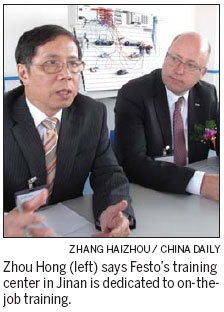Making it all work in the real world

Fifty apprentices, including Wu Xiangbo, enrolled at the college in September last year for a three-year course in industrial mechanics. After the first year focusing on theoretical studies on campus, they spend half the second year in partner companies. The third year will be dedicated to on-the-job training at workshops.
Apprentices at Festo receive instruction from six trainers who are all company engineers or highly skilled workers.
 |
After graduating with qualifications from the college and AHK, apprentices can expect to be offered jobs at Festo.
Festo has invested about 1 million euros ($1.28 million) to establish the training center, which includes a wealth of sophisticated specialist equipment and machinery.
"After three years, the apprentices are well trained, well educated, and can be productive," Fritsch says. "If you are oriented for the long term, education is the only way to meet all requirements."
Germany is not the only country with an eye on China's vocational training. Beijing and Berlin established a vocational education cooperation alliance in June last year when Premier Wen Jiabao visited Germany, and less than a month later, China and Britain signed a Memorandum of Understanding on the same basis.
British manufacturers have been quick to move in, with Jaguar Land Rover launching an apprentice training center in Guangzhou, in South China's Guangdong province, on Oct 31.
Located in Guangdong Jidian Polytechnic, the center has recruited its first batch of 40 apprentices.
|
||||
Beijing Hyundai, a joint venture established about a decade ago by the South Korean carmaker, is also now in partnership with Chongqing Lixin Vocational Education Center to train workers in the required skills.
Tan Sheng, a teacher in automobile repair at Lixin, says Germany's world leading global supplier of technology and services, Bosch, and the Japanese carmaker Toyota, have also set up classes there.
"More and more such programs have been set up in China in recent years."
The increasing prevalence of such projects highlights the growing importance China attaches to vocational education, but experts say there is still a long way to go before they can meet the demand from foreign companies.
These projects are just provisional measures taken by companies because there are no better options, says Feng Xiao, director of Tongji University's Institute of Vocational Instructors in Shanghai.
"The problem is how to address the loss of trained talent," he says, referring to the exodus of many skilled workers to other companies.
In Festo's case, apprentices have signed a contract to work at the company for at least three years after graduation.
Buschfeld, of the AHK in Shanghai, points out the limits foreign firms face when signing contracts with their apprentices. She says there is "no status of apprenticeship" in China's labor laws, so the contracts are not strictly binding.
She says this is a major challenge for her organization when promoting "dual education" in China.
Another drawback, Buschfeld says, is the perceived quality of the country's vocational training system. Normally, the better performers in the annual national college entrance exam go to universities, while those with lower grades turn to vocational colleges.
Buschfeld also sees the low respect paid to blue-collar work as a hurdle to promoting vocational education in China. In Germany, she says, many company bosses started off as apprentices.
However, she remains optimistic about promoting German-style vocational education in China, because "Chinese leaders are so open-minded" now and the "mind of the people has changed a lot".
Festo apprentice Wu is also optimistic about his future, especially since his first job is already secured.
"No matter what position I finally get here after I graduate, I'll be diligent and try my best to win promotion. Going to Germany? That will always be my target."
Cecily Liu contributed to this story.
zhanghaizhou@chinadaily.com.cn
(China Daily 11/09/2012 page12)
Today's Top News
- Xi stresses improving long-term mechanisms for cyberspace governance
- Experts share ideas on advancing human rights
- Japan PM's remarks on Taiwan send severely wrong signal
- Key steps to boost RMB's intl standing highlighted
- Sustained fight against corruption urged
- Xi calls for promotion of spirit of volunteerism
































